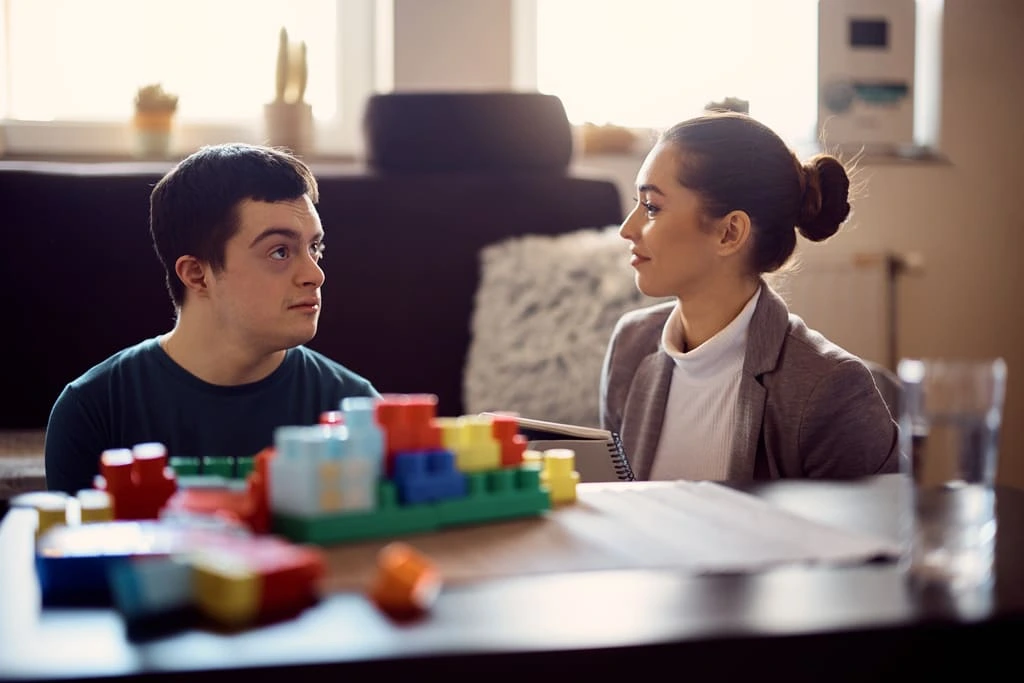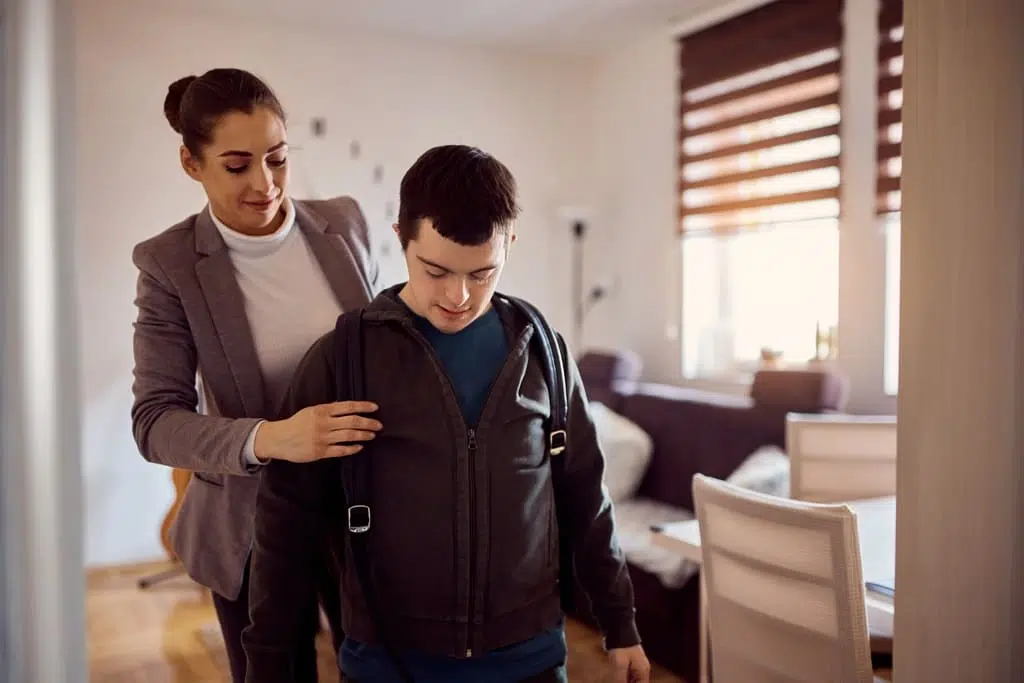What is Positive Behaviour Support (PBS)?
Positive behaviour support (PBS) is a person-centred approach developed to support people living with a learning disability, autism, mental health challenges and complex needs. It brings positive outcomes for the individuals who experience behaviour that challenges (known as challenging behaviour), impacting their day-to-day activities, relationships and every aspect of life. Positive behaviour support focuses on understanding the individual’s abilities, needs and preferences, aiming to improve their quality of life and supporting people in the activities and hobbies they love.
Children, young individuals, and adults with complex care needs deserve humanised care and support in their own homes, fully supported by caring and understanding care teams. To properly implement positive behaviour support means first properly identifying the root causes of the behaviour that challenges and then developing a behaviour support plan with active, proactive, and reactive strategies. The positive behaviour support plans follow the person-centric model that reduces the use of restrictive practices for autistic children, young individuals and adults living with learning disabilities. The person-centred approach enables improved quality of choices and aims to improve the quality of a person’s life.
At Leaf Complex Care, we love hearing from our clinicians how the people they support feel their human rights are respected. Please take a moment and read how Richard lives life on his own terms and has improved his health.
What Are Proactive Strategies?
The main goals of the proactive strategies are to ease the integration of the plans with current life situations, encourage functionally alternative behaviours, and provide suitable support to prevent challenging behaviour.
Positive behaviour support requires more than just reacting to challenging behaviour; it also involves implementing proactive strategies that promote long-term change. These proactive approaches aim to enhance an individual’s quality of life and reduce the occurrence of challenging behaviours. For individuals to live more independent lives, many helpful changes can be made in the person’s environment through the proactive approach. With the right support, right communication, and securing a safe environment with compassionate clinicians, the proactive strategies may include:

- Support in finding alternate ways of communication
- Including more daily activities supporting the preferences of the individual
- Offering different choices for activities
- Clarifying routines and providing schedulers or timers
The Escalation Cycle
Before we get to the escalation cycle of behaviour that challenges, we need to understand challenging behaviour itself and how it impacts people’s lives. It may refer to any behaviour that creates challenges for social interaction, safety, engagement and learning development. Behaviour that challenges is a type of communication or a response to unmet needs of the child or the older individual. Therefore, positive behavioural support and behaviour support plans take the main focus in the care journey to support autistic people and people with complex needs.
The stages of the escalations cycle are never fixated and depend on the individual’s distinct behaviour in a given situation or environment that the person finds challenging.
The Escalation Cycle involves five stages:
Trigger
This is the first stage that marks the beginning of challenging behaviour escalation. A particular event, behaviour or life situation may be the potential triggers, which can be internal or external. The internal triggers can be reflected as emotional tiredness and or feeling unwell, while the external result from an unstructured situation or a sudden change in routine. For support workers to undertake timely interventions, they must first be able to recognise the potential triggers as a first step in the process.
The first phase triggers one’s emotional response, causing feelings of stress and anxiety. The typical behaviour triggers include the moments when a person feels overstimulated by loud noises or bright lights, for instance. This is the phase when personalised support and the right PBS approach are most needed to prevent any challenging behaviour.
Escalation
In the second phase, the person’s behaviour gradually escalates, which may start with mild signs of discomfort or distress. This is the phase where the person may become more vocal about what they feel at the moment, leading to behaviours like fidgeting, raising the voice to a higher tone and becoming more argumentative. Since each person is different, in some cases, people can become more socially withdrawn. In these moments, the support workers will speak in a calmer tone to de-escalate the situation with interventions they had training for. One of these techniques is redirecting attention away from the trigger by taking a walk outdoors or just turning the music on, but each individual will have personalised techniques.
Crisis
The third phase is the crisis phase, in which the person’s behaviour escalates uncontrollably. In urgent situations like these, it is best to disengage because their perception is not receptive at the critical moment. A team of clinicians can keep the individual safe from harm and remove all dangers from the area.
De-escalation
As individuals begin to overcome the peak of the crisis experienced, care teams must maintain a calm atmosphere during this phase. The PBS plan and behavioural support provide autistic people or people living with learning disabilities with person-centred care that enables them to process their feelings subsequently.
This phase focuses on rebuilding trust with the person being supported. This type of support increases the chances for care teams to create a safe and open environment where talking about the experience is met with understanding and acceptance rather than judgment.
Stabilisation
In challenging behaviour, the stabilisation phase of the escalation cycle is the phase where individuals have calmed down but still may be emotionally charged or sensitive. It’s a time that requires a deep understanding, respect and compassion from those around them. This phase is often the most suitable for problem-solving and finding long-term solutions to the underlying challenges that triggered the behaviour.
Problem-solving strategies should be collaborative, involving the individual as much as possible. This approach helps find practical solutions and empowers the individual, giving them a sense of control over the situation.
Overall, the stabilisation phase is a critical opportunity to address the root causes of challenging behaviour and work towards preventing future escalations.
Implementing Positive Reinforcement
Implementing positive reinforcement in positive behaviour support during crises helps to manage challenging behaviours effectively. Positive reinforcement involves providing a reward that increases the likelihood of a behaviour occurring again. This can be challenging in crisis situations but is essential for promoting positive outcomes and de-escalating the situation.
Here are some strategies for implementing positive reinforcement in Positive Behaviour Support (PBS) during crisis situations:
Identify and understand triggers
Develop a crisis and a PBS plan
Use positive language and tone
Provide immediate reinforcement
Use high-value reinforcers
Monitor and adjust strategies
Collaborate with support teams
Always focus on safety


Positive Outcomes with PBS
Positive behaviour support focuses on enhancing an individual’s quality of life by promoting skills, independence, and social inclusion. Also, PBS helps individuals engage more practically in activities they enjoy and interact more positively with others. One of the primary outcomes of PBS is reducing challenging behaviours. By identifying the underlying causes of these behaviours and implementing proactive strategies, positive behaviour support can help individuals learn more adaptive ways of responding to their environment.
The comprehensive approach teaches individuals new skills and strategies to meet their needs and promotes their independence in a way that allows them to become more autonomous. Through positive behaviour support, individuals learn positive social skills, such as communication, problem-solving and how to resolve conflicts. Individuals are more likely to engage in meaningful activities as the challenging behaviour decreases. This can lead to increased participation in work, school, and community settings, ultimately improving their overall quality of life.
The approach promotes long-term success and helps individuals achieve positive outcomes over time when it comes to making decisions about how to be supported and live their best lives.
Listen to the story of Hayden and the additional support our clinicians provided in order for Hayden to live his best life.
What is a PBS Plan?
A positive behaviour support plan is a comprehensive document designed to understand and address behaviour and support people living with a learning disability, both children and adults, through person-centred support. This plan serves as a roadmap for caregivers, offering a step-by-step approach to enhancing the individual’s quality of life while helping caregivers recognise and manage episodes of behaviour that challenges.
A proper positive behaviour support plan is rooted in a functional assessment, ensuring the strategies are tailored to the individual’s needs. It encompasses proactive strategies, which aim to meet the individual’s daily needs and teach them essential communication and life skills, as well as reactive strategies, which are implemented to ensure safety and manage challenging behaviour during distressing situations.
The emphasis of a well-crafted PBS plan lies in its proactive strategies, outnumbering reactive ones. Encouraging positive and warm relationships is also highlighted, as feeling cared for and valued is just as vital as engaging in enjoyable activities.
Where Can it Be Used, and Who Should Use it?
The PBS plan is commonly used in all settings where the person spends his time, such as in their own home, out in the community, at school or college, when visiting a family member’s home or when going on holiday. The care team that supports the individual must follow the positive behaviour plan using proactive strategies and person-centred approaches.
It’s beneficial for caregivers of children or adults to observe what strategies are helpful or ineffective, allowing them to adjust or change approaches as needed. A positive behaviour support plan is designed for individuals who frequently experience behaviour that challenges and significantly impacts their lives. For instance, it might lead to exclusion from environments like schools, day centres, or community activities such as swimming. A PBS plan can be created and applied at any stage of life and help people integrate into society. The sooner challenging behaviour is understood and strategies are implemented to diminish these behaviours, the more advantageous it is for the individual and their caregivers.
PBS Support with Leaf Complex Care
Leaf Complex Care is a healthcare provider that enables positive behaviour support for behaviour that challenges. The focus is on understanding the underlying reasons for the behaviour and developing tailored care strategies. Leaf Complex Care ensures that trained support teams implement the PBS plan consistently. The plan is regularly monitored and reviewed to assess its effectiveness and make necessary adjustments.
We recognise the importance of collaboration and communication with the individual, family members, caregivers, and other healthcare professionals involved in their care. This collaborative approach ensures that everyone works together to support the individual in achieving their goals and improving their quality of life.
To learn more about how we can help you, contact us today or visit one of our offices in Bristol, Slough, Birmingham and Somerset.







